Georgia’s Shadow Tax: How the GDC Funds Itself by Exploiting Inmates
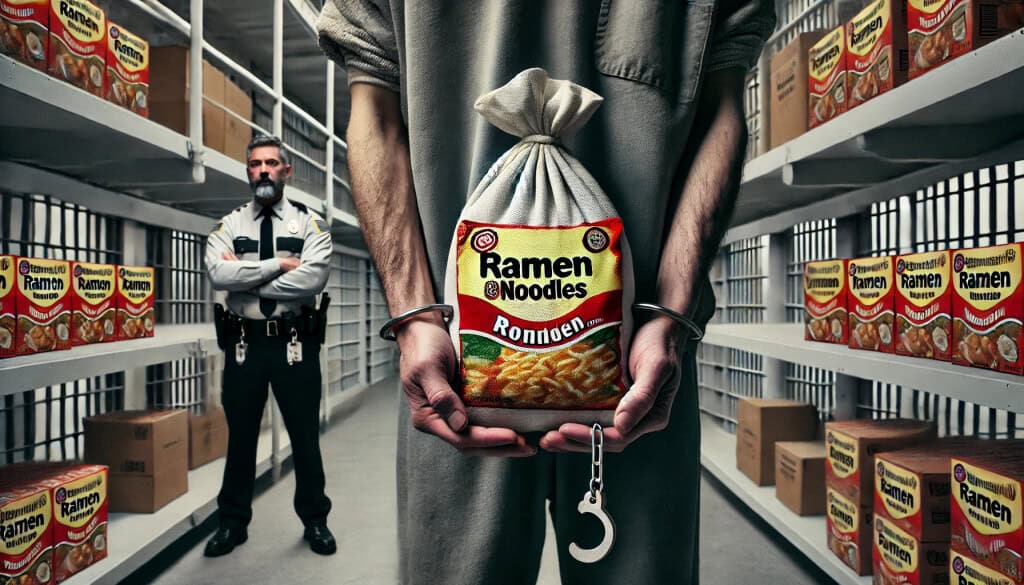
Georgia’s prison system has turned incarcerated people and their families into a captive revenue stream. The Georgia Department of Corrections (GDC) pulls in money through several channels that siphon funds from those behind bars:
- Commissary Sales and Markups – Every state prison runs a store selling basic goods (soap, toothpaste, ramen noodles, etc.) to inmates at inflated prices. These profits are supposedto go into a special inmate benefit account rather than the state treasury. In FY 2005, Georgia’s prison commissary sales totaled over $22 million1, and today annual sales are likely even higher. That translates to many millions in profit skimmed off incarcerated people’s purchases every year. In fact, when lawmakers forced a commissary price hike in 2020, it was projected to raise an extra $5 million a year from inmates’ pockets 2.
- Prison Phone Call Commissions – Georgia contracts with private phone vendors that kick back a huge share of call revenue to GDC. The state historically took a 60% commission on every prison phone call, raking in as much as $8.2 million a year from phone fees alone3. In 2019, Georgia received over $8 million in these telecom kickbacks 4. Every time an inmate’s family deposits money for a phone call, more than half effectively goes to pad the prison agency’s budget.
- Inmate Package and Email Programs – GDC also partners with care package vendors and email services. Families must buy pre-approved food packages or send paid electronic messages, with a cut of every sale going to the prison agency. These programs aren’t about security so much as profit: one major prison commissary company reported hundreds of millions in sales from such services nationwide, sharing profits with prison systems 5. Georgia’s prisons likely collect millions of dollars a year from holiday package markups and messaging fees – all funded by inmates’ loved ones.
- Account Fees and Miscellaneous Charges – Even an inmate’s own money isn’t safe. GDC policy imposes a $1 monthly “account maintenance” fee on each prisoner’s trust account (if they have over $10)6. They even charge $0.55 for each money withdrawal form an inmate submits7. It’s petty, but with over 50,000 incarcerated people, those dollars add up. In addition, any interest earned on inmate accounts, unclaimed money, or disciplinary fines can be funneled into the inmate fund as extra revenue8. GDC squeezes money from every possible source.
Bottom line: By design, Georgia’s incarcerated population (and their families) are paying millions of dollars into GDC-controlled funds every year98. Prisons and jails nationwide generate huge income this way, and Georgia is no exception. This shadow revenue exists outside of taxpayer appropriations – yet it’s generated on the backs of some of the poorest Georgians.
Supposed to Be “For Inmate Welfare” – On Paper

Why are Georgia prisons allowed to profit off people in custody? The official justification is that these revenues go into an “Inmate Welfare Fund” (also called the Inmate Benefit Fund) that must be used for the benefit of those inmates. GDC’s own policy explicitly states that prison store profits are “to be used for the benefit of the offenders” and “not be expended for any purpose not related to offender welfare,” barring written approval for exceptions10. In theory, this money should pay for things like recreational equipment, library books, educational programs, indigent inmate necessities, and other extras that improve quality of life behind bars. One might compare this to communism where the government gets to decide what’s good for the people and what’s not.
Across the country, inmate welfare funds are intended for collective benefits of incarcerated people: sports or hobby supplies, holiday meals, re-entry programs, etc. They were never meant to replace basic obligations of the state. Georgia’s fund is supposed to supplement prison life, not subsidize core operations. According to the Prison Policy Initiative, these accounts are “supposed to be used for non-essential purchases that collectively benefit the incarcerated population.”9 In fact, Georgia uses its inmate fund to cover the cost of indigent postage and writing materials as a loan to inmates – a legitimate use – and then reimburses the fund when those inmates receive money 1112. The idea is that inmates’ own money should circle back to help them.
However, that’s all on paper. In practice, poorly written rules and broad definitions of “inmate welfare” give officials free rein to tap this money for almost anything. GDC policy is riddled with vague allowances. For example, some necessities like hygiene items for indigent prisoners or facility maintenance projects can legally come out of the inmate benefit fund13 – even though those are clearly essential needs that should be funded by the state budget. By stretching the definition of “welfare,” prison administrators can justify spending inmate dollars on things the prison should be paying for anyway. This blurs the line between extras for inmates and expenses that belong in the general budget. Comparing again to a communist system, this system is ripe for abuse and corruption.
The Price-Gouging Scheme: Commissary Costs and Inflated Prices
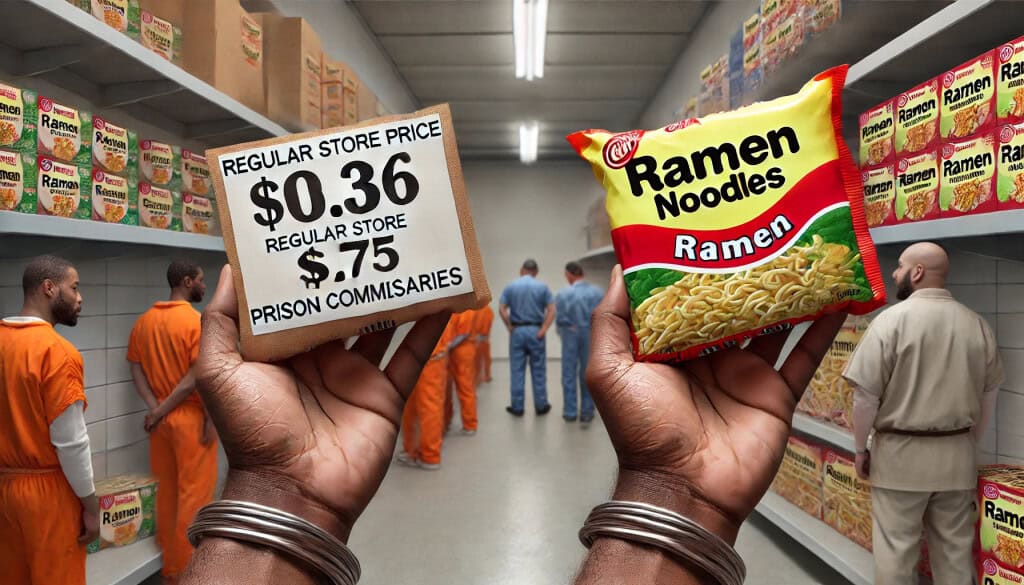
The Georgia Department of Corrections (GDC) isn’t just profiting from inmate funds—it’s robbing them blind through insane markups on basic necessities. GDC operates its commissary system through a no-bid contract with Stewart’s Distribution, and the prices inmates are charged are nothing short of extortion.
For example:
- Maruchan Ramen Noodles (a prison staple for survival)
- Walmart Price $0.25
- Stewart’s Contract Price: $0.36
- Inmate Retail Price: $0.79
→ Over a 100% markup. - Welch’s Fruit Snacks (5 oz bag)
- Amazon Price: $1.90
- Stewart’s Contract Price: $2.11
- Inmate Retail Price: $4.22
→ Double the price. - GCS 100% Colombian Coffee (8 oz generic)
- Maxwell House 8oz price: $5.22
- Stewart’s Contract Price: $5.63
- Inmate Retail Price: $10.46
→ An 85% markup on a necessity.
The following photos are from a confidential GDC price list GPS obtained:




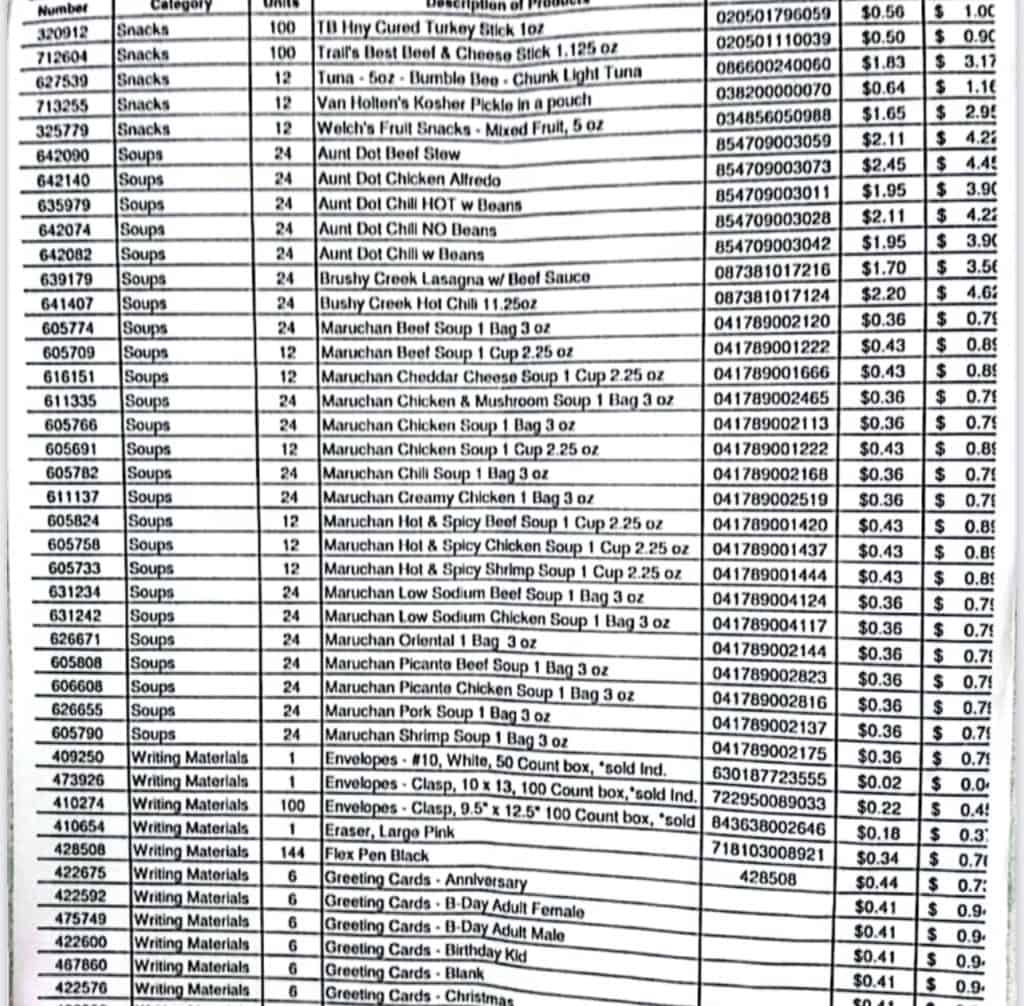
Even something as simple as a Coca-Cola (20 oz bottle) is marked up nearly 90%. And let’s not forget—these are people that are not paid any wages for their work.
Worse yet, the contract prices Stewart’s Distribution charges the state may already be inflated before the prison even applies its outrageous markups. Since Stewart’s operates under a no-bid system, there’s no way to know whether GDC is deliberately overpaying for products so they can justify charging inmates even more. If there were any transparency, we might see a corrupt arrangement where kickbacks or backroom deals allow Stewart’s and prison officials to split the profits at the expense of inmates and their families.
This nicely completes comparison with a communist system.
We are not even considering the fact that Georgia prisons aren’t feeding prisoners properly, forcing them to buy outrageously priced food just to survive.
The bottom line? This isn’t just price-gouging—it’s outright theft from Georgia’s poorest and most vulnerable citizens.
View the entire price list here.
Zero Transparency and No Real Oversight

If the funds were truly spent on prisoner welfare, one would expect to see detailed public accounts of that spending. Not so in Georgia. The GDC’s inmate money system operates in near-total secrecy. There are no annual public reports or audits released to taxpayers or prisoners outlining how tens of millions in commissary and phone profits are used. In fact, Georgia’s oversight of these “Inmate Welfare Funds” is virtually nonexistent by design. State policy only requires any reporting on the fund “upon suspicion of fraud, changes in personnel managing the fund, or extensive funding shortages.”14 In other words, unless something goes obviously and catastrophically wrong, GDC doesn’t even have to produce a report on this money. Contrast that with states like California or Washington that at least post audits for transparency14 – Georgia does nothing of the sort.
Internally, GDC claims to audit these accounts, but those audits aren’t public. The agency’s Finance Division says it audits commissary and inmate benefit fund activity for compliance15, but only for internal eyes. Neither the legislature nor any external watchdog regularly examines where inmate money goes. No independent board including incarcerated representatives exists to approve expenditures (unlike a few states that allow inmate input16). Essentially, wardens and prison administrators have a slush fund that they alone control, under only the loosest guidelines. It is money taken from prisoners that can be spent by prison officials with no outside scrutiny. This lack of transparency means we have to take the prison officials at their word – a terrible idea given the perverse incentives at play.
Remember, these funds are not taxpayer dollars; they are off-budget “trust” funds filled with prisoner and family payments. That makes them easy to abuse. There is no line item in the state budget detailing inmate fund revenues or expenditures. Legislators don’t debate it, and the public can’t easily find information. In Georgia, as one analysis put it, welfare fund policies are so lax that officials enjoy “wide discretion to spend incarcerated peoples’ money as they please”13. Is anyone surprised, then, that these piles of inmate cash disappear into the system with little to show?
Lawmakers Made Things Worse During COVID
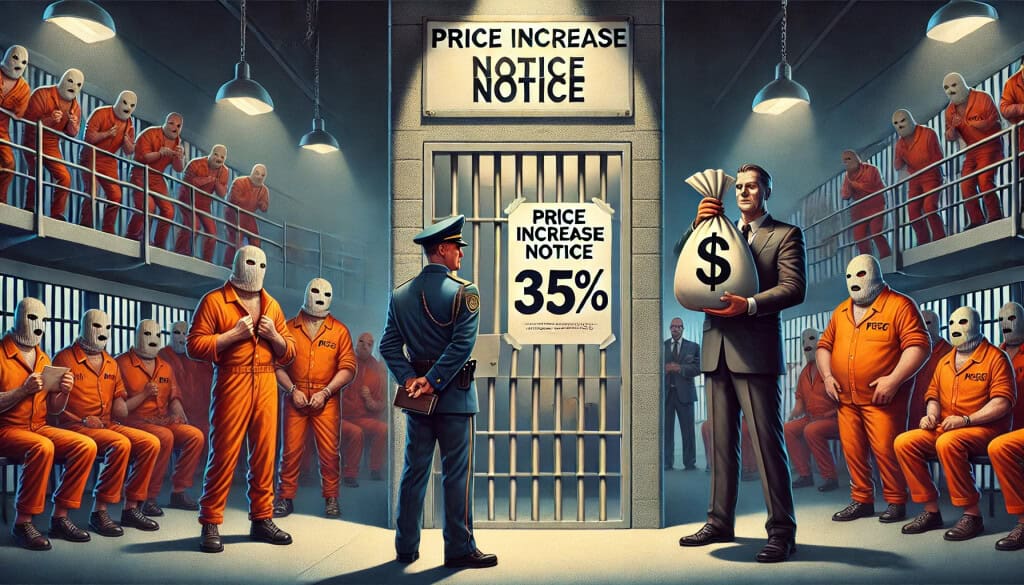
As if the inherent lack of oversight weren’t bad enough, Georgia’s elected officials have actively encouraged GDC to extract even more from inmates. In 2020, during the pandemic budget crisis, the Georgia legislature and Governor slashed funding for the Department of Corrections. Rather than fill the gap with general funds, they explicitly leaned on inmate revenue. In the Fiscal Year 2021 budget, lawmakers implemented a $5 million cut to state prison funding to be offset by raising commissary prices 2. In plain language: they told GDC to make the prisoners and their families pay $5 million more for basic necessities to cover the state’s shortfall.
This mandate came at the height of COVID-19, when prisoners were on lockdown and families were under economic strain. Nevertheless, Georgia politicians saw fit to plug budget holes on the backs of incarcerated people. The Georgia Budget and Policy Institute reported that this move made hygiene products and food more expensive for those inside, directly increasing the financial burden on inmates’ loved ones 17. By hiking commissary markups, the state essentially imposed an extra regressive tax on some of Georgia’s poorest citizens (incarcerated people typically had incomes well below the poverty line even before prison). It’s galling: rather than funding prisons adequately and humanely, Georgia’s government chose to milk the inmate welfare fund for operational money. This policy not only underscores how reliant GDC has become on inmate-derived revenue, but it also blurs the purpose of the fund – turning what should be “welfare” into just another budget patch. And still, no one demanded transparency about how that extra money would ultimately be spent.
Allegations of Rampant Misuse

With so much unchecked money floating around, it’s no wonder that Georgia prisoners widely believe the inmate welfare funds are being misused. Time and again, credible reports from inside have described patterns of abuse and questionable spending. Among the allegations we’ve heard from inmates across multiple facilities:
- Staff Parties and Perks: Prisoners say their welfare funds have paid for elaborate staff birthday celebrations, holiday parties, and employee appreciation events. In one instance, inmates allege, a warden approved spending inmate money on a staff Christmas party – buying catering and gifts – all under the guise of “morale.” These are blatant violations of the principle that inmate funds benefit inmates, yet behind prison walls, who is going to stop it?
- “Extras” for the Prison, Not Prisoners: At some Georgia prisons, wardens have openly bragged about using inmate fund dollars to buy facility items like new lawnmowers, water coolers, and even a water fountain for the prison yard. One warden allegedly told inmates that the nice landscaping equipment they see is thanks to commissary profits. A water fountain might be a minor convenience for inmates, but a lawnmower clearly benefits the facility’s maintenance staff – it should come from the state maintenance budget, not prisoner welfare funds. These anecdotes suggest administrators freely treat the inmate fund as a catch-all piggy bank for things the state won’t pay for.
- Shell Companies and Kickbacks: Perhaps the most disturbing allegations involve outright corruption. There are whispers that at least one Georgia deputy warden set up a shell vendor company to do business with his own prison – selling food and supplies at inflated prices, then billing the inmate benefit fund. In this scheme, the official would essentially be funneling inmate money into his own pocket via a fake third-party provider. If true, this is criminal fraud, plain and simple. While these claims have yet to be proven in court, they underscore the extreme temptation and lack of oversight surrounding these funds. GDC’s culture practically invites profiteering by any staff with access to the money.
It’s important to note that these are allegations from inmates and some staff whistleblowers – the GDC certainly isn’t reporting this behavior. But given the consistent themes of these reports and what we see happening in similar systems, they are highly credible. Without transparency, it’s impossible to know how widespread such misuse is, but the pattern is clear: money meant for prisoner welfare is being diverted to benefit prison officials and operations. When wardens can sign off on spending with no independent review, is it any surprise that self-serving expenses slip through? This is exactly what happens when you hand someone an unmonitored slush fund.
Fulton County Jail Scandal: A Stark Warning
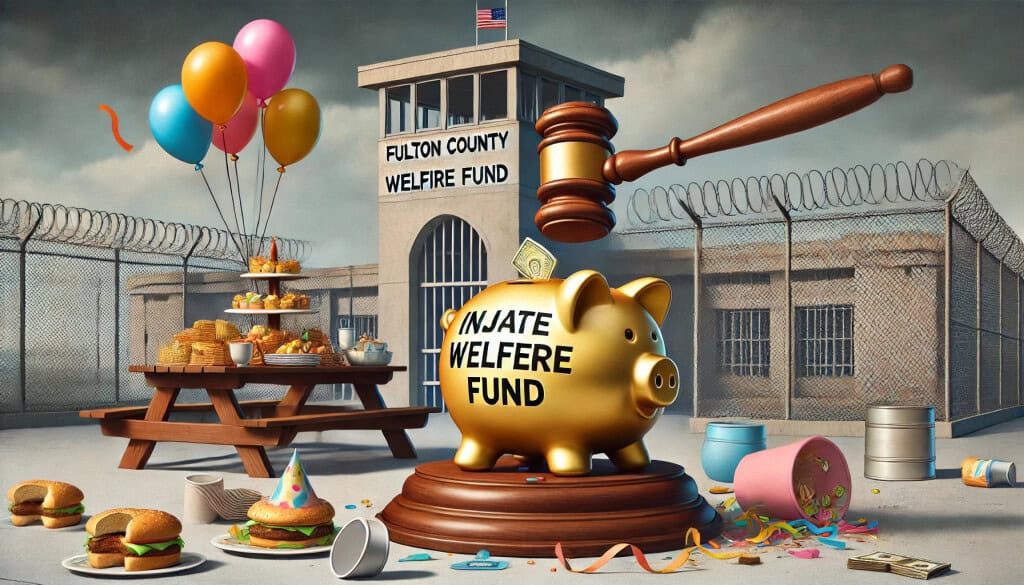
If anyone doubts how attractive these inmate funds are for abuse, look no further than the scandal at Fulton County Jail last year. Fulton County’s inmate welfare fund (fed by jail commissary and phone profits) became a slush fund for the Sheriff’s Office, until an audit finally exposed the truth. The revelations were outrageous: jail officials had spent tens of thousands of dollars from the inmate fund on things that had nothing to do with inmate welfare. According to news investigations, about $40,000 went to buy gift cards from Honey Baked Ham Co. for an employee holiday party, $5,000 was spent on a Thanksgiving turkey giveaway (a community event, not even for inmates), and $2,600 on florist bills – all paid out of money intended for inmates. They even rented entertainment like a bounce house and hired DJs for staff events with those funds18.
When pressed, Fulton County Sheriff Pat Labat actually defended these expenditures by saying “everything that has come out of the inmate welfare fund has been spent on the betterment of the sheriff’s office”19 – a chillingly honest admission that in their mind, benefiting the sheriff’s office was apparently the goal instead of benefiting inmates. In the fallout of this scandal, Fulton County commissioners were so appalled that they abolished the jail’s inmate welfare fund entirely 20. But that knee-jerk reaction meant that money that should have gone to inmate needs (like indigent inmate mattresses and blankets) simply vanished into the county’s general coffers21. The inmates lost out twice: first their money was misspent on deputies’ perks, then the fund was dissolved so that future revenue wouldn’t even be set aside for them at all.
Why highlight this? Because the Fulton Jail example is a microcosm of what likely happens throughout Georgia’s state prisons – except state prison officials never face an audit or public scrutiny. In Fulton County, there was at least a county ordinance establishing an oversight committee (which, it turns out, never actually met22) and eventually a whistleblower or inquiry that led to an audit. Even that jail, with all its problems, had to answer to county commissioners and ultimately the public. And still, they got away with abuse for years until media caught on. Imagine what the Georgia DOC has been doing with inmate funds behind closed doors, with even less oversight than a county jail. Fulton shows that when inmate money is up for grabs, some officials will absolutely treat it like a private ATM. Georgia’s prison wardens know no one is looking over their shoulder – a recipe for exactly the same kind of misconduct, if not far worse.
Even Less Oversight in State Prisons – A Recipe for Abuse
Compared to a county jail, Georgia’s state prison system is an oversight black hole. There’s no independent committee of local officials monitoring GDC’s inmate benefit fund usage. The Board of Corrections (appointed political appointees) certainly isn’t inspecting line-item expenditures of commissary profits. And as noted, no law requires GDC to publicly report a dime of it. If Fulton County’s fund was a cookie jar, GDC’s fund is Fort Knox – with wardens holding the keys and no cameras watching. It is virtually certain that similar abuses have occurred in Georgia state prisons, but they remain hidden by the lack of transparency. In fact, Sheriff Labat in Fulton County admitted he wasn’t even aware an oversight committee was supposed to exist until the scandal broke2324. If a high-profile jail in Atlanta could operate its inmate fund with zero oversight until caught, what do you think is happening in dozens of state prisons scattered across Georgia? Nothing good.
The GDC’s own policies acknowledge no meaningful limits beyond broad “inmate welfare” language. As long as an expense can be loosely justified as benefitting inmates in some way, it can be greenlit. Need new lawn equipment to keep the prison grounds tidy? Sure – call it an “environmental health upgrade to the facility” and charge it to the inmate fund (such uses are actually allowed under some states’ welfare fund rules25). Short on money to buy staff new uniforms or vehicles? Perhaps spin it as necessary for security which “benefits inmates” and dip into their fund. This isn’t hypothetical – Fulton Jail spent over $500,000 from its welfare fund on security vehicles and equipment26, and the sheriff argued that could be legitimate. GDC has even fewer checks, so it’s likely doing the same on a larger scale.
The lack of audits or public accounts means GDC administrators feel untouchable. Unless someone blows the whistle, they will continue quietly shifting costs to inmate funds. Georgia’s state budget for FY2024 was $1.32 billion for Corrections27, but that doesn’t even account for the shadow budget of inmate money GDC also wields. This shadow budget can pay for things the state legislature never explicitly approved. Essentially, GDC can self-fund its pet projects or cover budget shortfalls by raiding inmate dollars – all without public debate. That is an outrageous setup that invites corruption.
Stop Funding Prisons on the Backs of Inmates

Enough is enough. It’s time to call this what it is: A Criminal Thief Ring. By exploiting captive consumers and then hiding how the money is spent, GDC officials have created a system ripe for abuse – criminal abuse. The pattern is clear from the evidence we do have: from the legislature’s commissary price hike scheme to the Fulton County fiasco to insiders’ reports of blatant misuse, the inmate welfare fund is not benefiting inmates as intended. It’s propping up prison operations, and in some cases, undoubtedly lining someone’s pockets or indulging staff luxuries.
This is state-sanctioned theft from incarcerated people and their families. Every dollar that an inmate’s mother spends on an overpriced phone call, every dollar a father spends sending a care package to his son, and every dollar an inmate pays for soap or ramen noodles to survive – those dollars are supposed to improve life for the people inside. When that money instead buys a warden a new lawnmower or pays for a staff party, it is nothing short of fraud and betrayal. Georgia prisons are literally being funded on the backs of the inmates, a population with no political voice and very little sympathy from those in power.
The lack of transparency enables this ongoing abuse. If GDC had to open its books, if independent auditors or advocacy groups could see where inmate fund money goes, the officials in charge would think twice before using inmate dollars as their personal slush fund. Sunlight is the best disinfectant – and right now GDC operates in darkness. We must demand public audits and external oversight of all inmate benefit funds. The legislature should require GDC to report annually on these funds, and prohibit using them for any expense that the state should cover (like maintenance, security, or staff amenities). Ultimately, Georgia should not be balancing prison budgets by extorting those least able to pay.
Prisoners may have broken the law, but that doesn’t give the state the right to pick their pockets clean and lie about it. GDC administrators and wardens have shown that they cannot be trusted to police themselves – not when there’s a multimillion-dollar honeypot on the table. It’s time to hold them accountable. Georgia cannot continue to allow prison officials to enrich their facilities (or themselves) under the guise of “inmate welfare.” Until we see exactly where this money is going, we have to assume the worst – and all signs point to a systemic pattern of misuse and abuse.
Incarcerated Georgians and their families deserve better. They are already punished by incarceration; they should not be punished again financially to fund unauthorized projects or employee perks. The GDC’s secret cash cow must be exposed and stopped. It’s not just a matter of accounting – it’s a matter of justice. Georgia’s inmate welfare funds should actually benefit the inmates, or else the entire scheme is a cruel joke. We’re calling on the GDC and Georgia’s leaders: show us the records, prove us wrong – if you can. If you can’t (or won’t), then it’s time for a reckoning and real reform to end this exploitation of prisoner funds. The days of unchecked slush funds must end now.
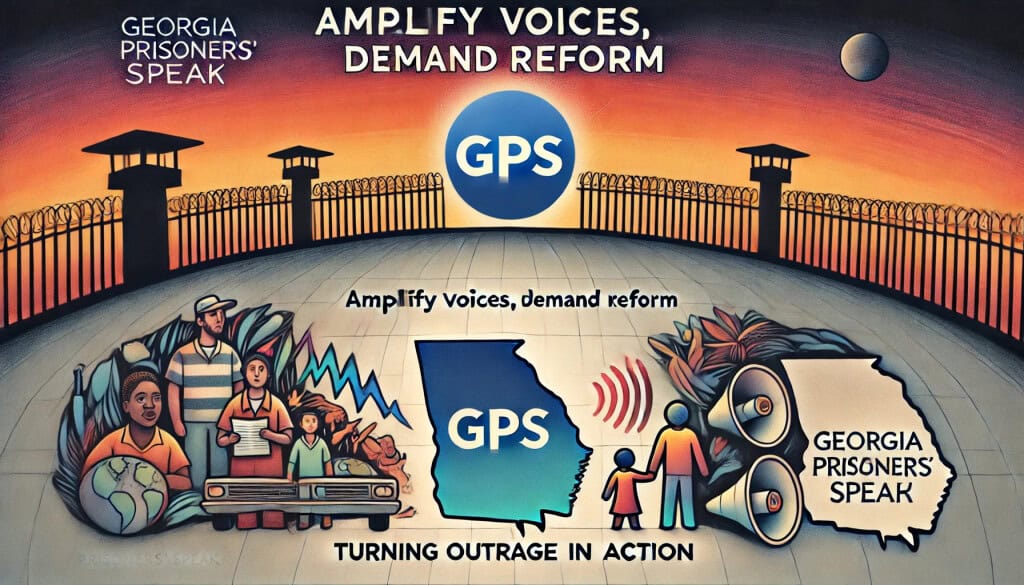
I owe a special thanks to Leo Alexander for his invaluable assistance in teaching me how to do this in-depth research and how to present it. -Justice
Footnotes
- https://gdc.georgia.gov/document/gdc-annual-fiscal-report/gdc-annual-fiscal-report-2005/download#:~:text=inventories%20and%20verify%20that%20pricing,The%20section%20also[↩]
- House Appropriations Approves Changes to FY 2022 Budget, https://gbpi.org/house-appropriations-approves-changes-to-fiscal-year-2022-budget/[↩][↩]
- https://www.ajc.com/blog/investigations/georgia-cashes-predatory-inmate-phone-fees/ShczOGppkRb5qirwpxdyaM/#:~:text=A%20contract%20to%20provide%20inmate,guaranteed%20income%20in%20a%20year[↩]
- No-Cost Communication – Reform Georgia, https://www.reformgeorgia.org/platform/no-cost-communication/[↩]
- The Marshall Project – The Big Business of Prisoner Care Packages, https://www.themarshallproject.org/2017/12/21/the-big-business-of-prisoner-care-packages[↩]
- https://public.powerdms.com/GADOC/documents/105150#:~:text=5,exist%20to%20deduct%20the%20full[↩]
- https://public.powerdms.com/GADOC/documents/105150#:~:text=E,for%20an%20envelope%20and%20stamp[↩]
- https://www.prisonpolicy.org/reports/shadowbudgets.html#:~:text=How%20do%20welfare%20funds%20get,custody%2C%20contraband%2C%20or%20%2042[↩][↩]
- https://www.prisonpolicy.org/reports/shadowbudgets.html#:~:text=Prisons%20and%20jails%20generate%20billions,funds%20an%20irresistible%20target%20for[↩][↩]
- https://public.powerdms.com/GADOC/documents/105110#:~:text=2,for%20the%20Administration%20%26%20Finance[↩]
- https://www.law.umich.edu/special/policyclearinghouse/Documents/Georgia%20DOC%20Mail%20Policy%20(IIB0401.SOP).pdf#:~:text=class%20postage,00[↩]
- https://www.law.umich.edu/special/policyclearinghouse/Documents/Georgia%20DOC%20Mail%20Policy%20(IIB0401.SOP).pdf#:~:text=g,at%20any%20time%20after%20being[↩]
- https://www.prisonpolicy.org/reports/shadowbudgets.html#:~:text=Although%20welfare%20funds%20are%20generally,as%20they%20please%20%E2%80%94%20sometimes[↩][↩]
- https://www.prisonpolicy.org/reports/shadowbudgets.html#:~:text=be%20conducted%20by%20the%20State,view%20of%20the%20incarcerated%20population[↩][↩]
- https://gdc.georgia.gov/organization/about-gdc/divisions-and-org-chart/administration-finance-division/finance-units#:~:text=Fiscal%20Audits%20is%20responsible%20for,for%20compliance%20with%20departmental%20policies[↩]
- https://www.prisonpolicy.org/reports/shadowbudgets.html#:~:text=higher,these%20committees%20are%20supposed%20to[↩]
- GBPI 2021 Budget Analysis, https://gbpi.org/house-appropriations-approves-changes-to-fiscal-year-2022-budget/[↩]
- https://www.wsbtv.com/news/local/fulton-county/hundreds-thousands-intended-fulton-co-inmate-welfare-misspent-gift-cards-uniforms-more/SNL5FFNTGRFJNGDJRBGSAYXFEE/#:~:text=Some%20examples%20Channel%202%20Action,employee%20appreciation%20and%20community%20diversion[↩]
- https://www.wsbtv.com/news/local/fulton-county/hundreds-thousands-intended-fulton-co-inmate-welfare-misspent-gift-cards-uniforms-more/SNL5FFNTGRFJNGDJRBGSAYXFEE/#:~:text=%E2%80%9CThere%20was%20no%20criminal%20intent,the%20sheriff%E2%80%99s%20office%2C%E2%80%9D%20LaBat%20said[↩]
- Fox5 Atlanta – Fulton County scraps jail’s inmate welfare fund amid misuse, https://www.fox5atlanta.com/news/fulton-county-jail-inmate-fund-scrapped-misuse[↩]
- https://www.prisonpolicy.org/reports/shadowbudgets.html#:~:text=expenditures%2C%20Fulton%20County%20Sheriff%20Pat,to%20the%20county%E2%80%99s%20general%20fund[↩]
- https://www.prisonpolicy.org/reports/shadowbudgets.html#:~:text=investigation%20into%20stolen%20welfare%20funds,chairman%20of%20the%20Fulton%20County[↩]
- https://www.wsbtv.com/news/local/fulton-county/hundreds-thousands-intended-fulton-co-inmate-welfare-misspent-gift-cards-uniforms-more/SNL5FFNTGRFJNGDJRBGSAYXFEE/#:~:text=LaBat%20said%20the%20money%20in,and%20from%20inmate%20phone%20calls[↩]
- https://www.wsbtv.com/news/local/fulton-county/hundreds-thousands-intended-fulton-co-inmate-welfare-misspent-gift-cards-uniforms-more/SNL5FFNTGRFJNGDJRBGSAYXFEE/#:~:text=LaBat%20said%20he%20saw%20an,to%20Channel%202%20Action%20News[↩]
- https://www.prisonpolicy.org/reports/shadowbudgets.html#:~:text=,Contraband%20detection%20equipment[↩]
- https://www.wsbtv.com/news/local/fulton-county/hundreds-thousands-intended-fulton-co-inmate-welfare-misspent-gift-cards-uniforms-more/SNL5FFNTGRFJNGDJRBGSAYXFEE/#:~:text=Channel%202%20Action%20News%20tallied,related%20expenses[↩]
- https://gbpi.org/overview-2024-fiscal-year-budget-for-the-georgia-department-of-corrections/#:~:text=Overview%3A%202024%20Fiscal%20Year%20Budget,previous%20fiscal%20year%27s%20spending%20level[↩]
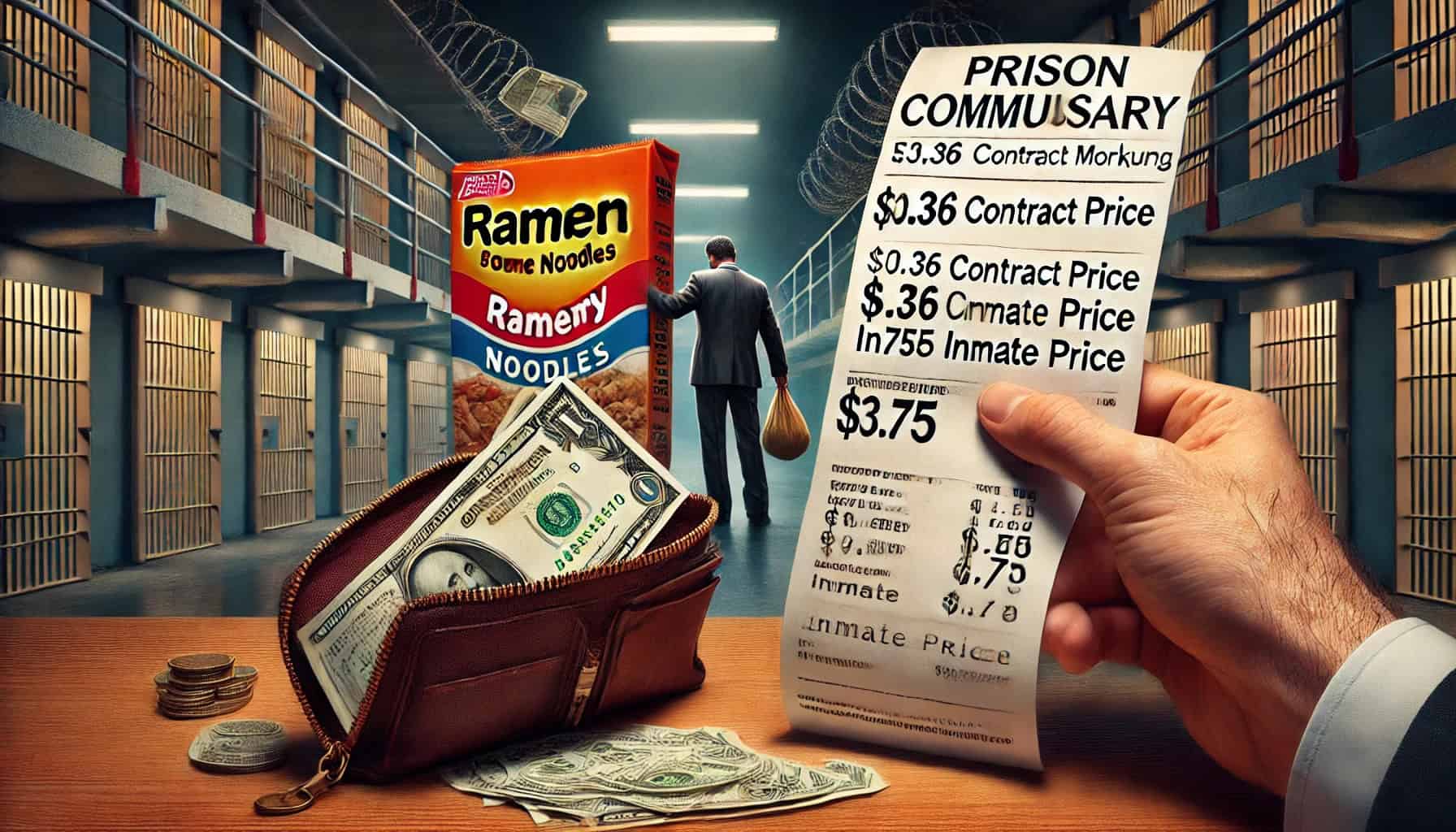
1 thought on “Who’s the Real Criminal? How Georgia Steals money”